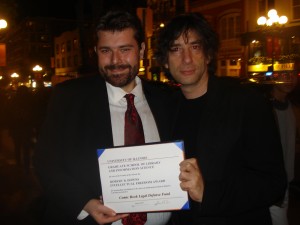The Hooded Utilitarian’s Sean Michael Robinson delivers a well constructed analysis of the case of Steve Kutzner, an Idaho man who plead guilty to possession of “obscene visual representations of child sexual abuse” last month.
The most widely reported element of Kutzner’s conviction is that he plead guilty to possessing pornographic art depicting characters from the Simpsons, but Robinson digs into the plea agreement and talks to the prosecuting attorney to find that the case wasn’t so clear-cut. Kutzner was flagged by German authorities who believed he was participating in file-sharing of actual child pornography, and when United States authorities investigated they found there was evidence enough to argue that he had, although that evidence was triable.
Robinson’s reporting paints a vivid picture of the legal issues at stake. He speculates on the probable defensive posture that would have been taken if this case had gone to trial, emphasizing that the government would have had the burden of proving the material Kutzner plead guilty to possessing was obscene.
More intriguingly, he illustrates how the threat of mandatory minimum sentences is being used by prosecutors to scare up plea agreements from people like Kutzner and Handley.
The conclusion Robinson arrives at is that, in this case, probably Kutzner was guilty of something. But the law in question is being applied on a case by case basis in a way that makes more people vulnerable to prosecution for possession of drawings. As more prosecutors begin taking up these sorts of cases, the line between art and obscene visual representations of child sexual abuse is in the eye of the prosecuting beholder.
It’s a good article about a bad law.
Read more →
 The nomination of John G. Roberts to the Supreme Court in 2005 caused considerable protest among politicians and law experts, many of whom voiced concerns over Roberts’ typically conservative stance in his decisions.
The nomination of John G. Roberts to the Supreme Court in 2005 caused considerable protest among politicians and law experts, many of whom voiced concerns over Roberts’ typically conservative stance in his decisions.
